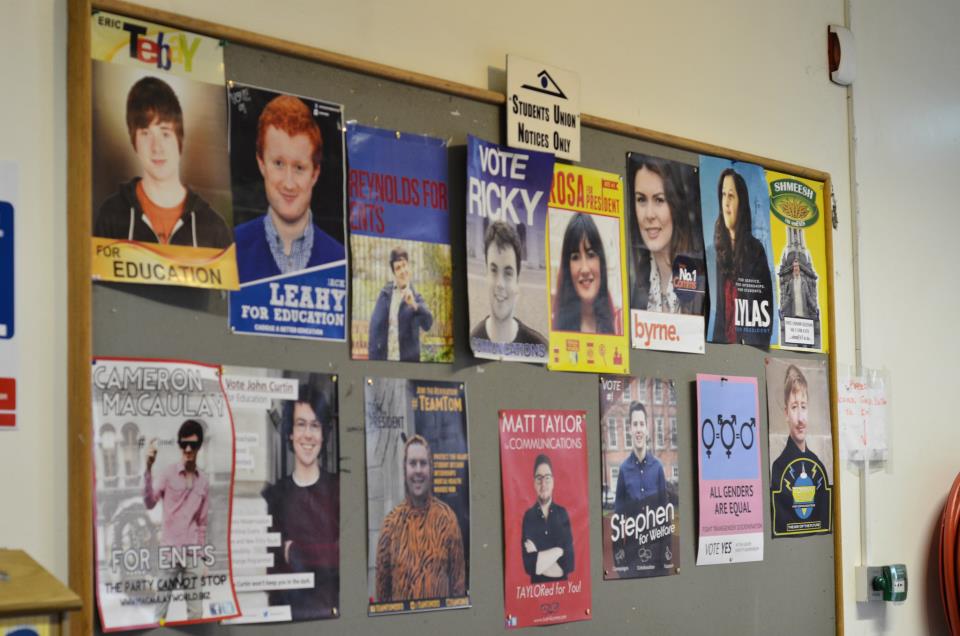Paul Glynn | Senior Staff Writer
The two weeks of campaigning for the TCDSU elections stand out on the Hilary Term calendar for enough reasons. For roughly ten to sixteen students each year, it’s a fortnight of late nights, trips to the printers at Reads, standoffs with campaign managers and the Electoral Commission, memorising the strategic plan, and vote-count nerves. For the rest of us, it’s more akin to a combat zone. That is, two weeks of hounding, leaflet-peddling and colourful t-shirt-wearers interrupting the start of lectures you weren’t planning on paying much attention to anyway. The surge in campus traffic means that if you’re not a fan of the bedlam of the new and improved Leadership Race™, the Arts and Hamilton buildings are no-go zones. Off-campus locations such as the teaching hospitals are no longer “safe spots”, and even escaping to the library involves strategic dodge-work.
The disdain with which some of us regard election season raises a question. What if there were no such on-the-ground, in-person campaigning? What if, instead of the two weeks of intense canvassing, we had two weeks of, well, normal activity? We’re going to have to elect six officers anyway, so how would the dozen or so students vying for your vote get their message out?
Online seems like the natural answer. It sounds blissful – no hordes of campaigners of dubious sincerity throwing around reading material, no eye-rolling at stunts, and no trees being murdered for manifestos. However, the extent to which we’d be less annoyed is questionable. After a while, you’d probably get tired of endless pleas to change your cover photo or profile picture on Facebook, and the “mute” function on social networking sites will never have been clicked as much. Remember, energy can neither be created nor destroyed – it can only change its form, and in this case what goes for atoms also goes for election zeal.
Indeed, the all-online road has been travelled before. Cast your mind back to 2014, if you were around, when PJ Moloney ran for the Communications role and conducted the entirety of his campaign online, decked out with Facebook banners, Twibbons and viral video content. His reasoning for doing so was to point out that the Students’ Union does not take nearly enough advantage of online sources of communication to connect with the students it represents, and thus he decided to step away from conventional canvassing. PJ did not win his election. In fact, he only won 28% of the vote in a two-horse race. However, it’s fair to say that his approach to campaigning raised some questions about the way we have traditionally done so. Indeed, the SU has a shrug-worthy track record of digital engagement, and the TCDSU website has been a contentious topic for many former candidates for all positions.
Yet there are incredibly important aspects to student campaigning that we tend not to think much of that illustrate its importance. Such a sophisticated and serious approach to campaigning may seem excessive, considering this isn’t exactly on a national level and Trinity represents a mere microcosm in the milky way of society. It may not be as sophisticated as national general elections, but there is an admirable sense of organisation and structure that would leave the likes of Anthony Downs and Maurice Duverger very impressed.
The entire campaigning system also offers students a chance to hone the talents they take very seriously. Students with a knack for graphic design can help create posters and add professional finesse to manifestos and leaflets so they look less like take-away menus. If you’re good with a guitar, why not write a song about how great your friend could be as Welfare and Equality officer, and sing it to an audience of students and confused tourists outside the Arts café? And, of course, being a campaign manager demands skills of organisation, strategy and people skills that, like many other related roles, will stand confidently on your CV in the future.
The seriousness with which the students vying for your vote take these two weeks of canvassing is only a testament to the seriousness with which they will take their jobs in House Six, if they’re successful. We tend to often brush off candidates as attention-seeking and power-tripping, but on closer reading, behind the manifesto and the class addresses is a motivated, passionate and brave student who envisions action and change. Running for election and putting yourself out there publicly is a big deal – if it weren’t, there’d be hundreds of people running for office.
The truth is, we need the campaign weeks the way they are. A certain vibrancy comes to the college atmosphere, and it’s also an opportunity to showcase Trinity students as entrepreneurial, passionate and smart. It might not sound ideal, but hitting a nerve every now and then might just be what it takes to get us voters to listen, considering traditionally humble turnouts in SU elections. So if you’re planning on battening down the hatches for the week to avoid the saturnalia of campaigning and canvassing, at the very least take it all with a pinch of salt. The next bunch of sabbatical officers are real forces for change in the little universe of Trinity College, but they can’t get much done if we don’t know what they’re all about and if we don’t know who they are. The Leadership Race is a chance to know our union and know what it does, and perhaps get inspired to make our own social change. So keep your eyes and ears open, just a little bit, so that you can cast a well-thought out vote at the end of the week.







